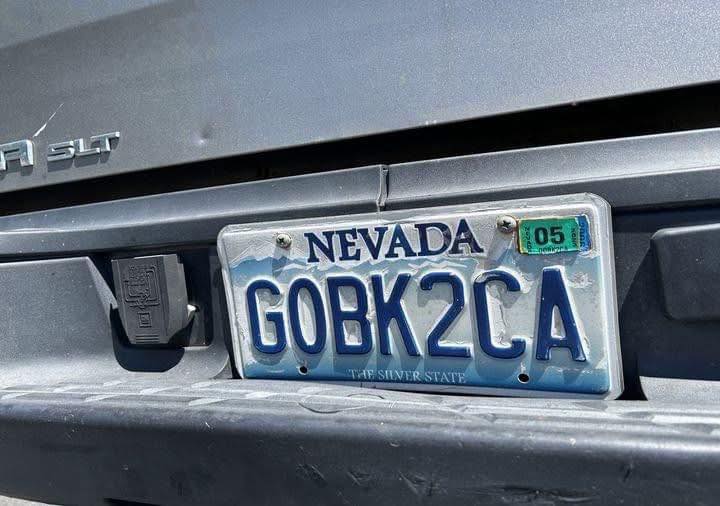Take a closer look at personalized license plates, and you’ll quickly realize that many of them are more than just random combinations of letters and numbers. Some are clever, some are funny, and others are intentionally bold or provocative. That’s exactly what happened with a Nevada license plate that recently went viral for sending a not-so-subtle message: “Go back to California.

” At first glance, it might look like just another vanity plate, but once people recognized the meaning behind it, the plate exploded in popularity online. It quickly racked up more than 80,000 likes on Facebook and sparked heated debates among users who either found it hilarious or downright offensive. While some thought it captured a growing sentiment among Nevada locals frustrated with out-of-state transplants, others felt the message was hostile and inappropriate for public roads. Eventually, the controversy grew enough that the Nevada Department of Motor Vehicles stepped in and officially recalled the plate, deciding that the message crossed the line of what’s acceptable for a government-issued item.
This isn’t the first time a vanity plate has been pulled from circulation for its content, and it likely won’t be the last. Personalized license plates have long been a way for drivers to express themselves, whether it’s through humor, wordplay, or subtle hints about their lifestyle or interests. But not every clever idea is fit for public display. The DMV in each state, including Nevada, has a review process in place specifically to prevent offensive, suggestive, or inappropriate content from making it onto the roads. In fact, there’s a long list of rejected plate submissions every year, many of which people submit in the hopes of slipping something edgy or controversial past the authorities. Some of the most commonly rejected examples include plates like “SAUC3D,” “RAMP4GE,” “F4K3 T4XI,” and “BUYAGRAM.” While these may appear harmless to some at first, they can be interpreted in ways that suggest violence, illegal activity, or adult content.
For example, “BUYAGRAM” could be seen as referencing the purchase of drugs, while “F4K3 T4XI” hints at something shady or inappropriate. The review teams that handle these applications are trained to catch these hidden messages, even when they’re masked with numbers or creative spelling. What many people don’t realize is that there’s actually a dedicated group of individuals within the DMV who carefully review each vanity plate request. These teams assess applications based on a range of criteria, from language and cultural context to slang and current trends. If a proposed plate raises a red flag, it’s usually rejected.
Sometimes, a plate that seems fine at first glance may be pulled later if the meaning becomes clearer over time or if complaints are received from the public. Interestingly, data shows that men are statistically more likely than women to request personalized plates. For many, it’s a fun way to make a car stand out, reflect a favorite hobby, or even share a private joke. But for others, it becomes a way to push boundaries or make bold statements—some of which walk a very fine line between humor and offense. In many cases, people try to be clever by using letter-number combinations or slang that’s not immediately obvious. Still, the DMV’s review process is fairly thorough, and most of these attempts are caught before they reach the printing stage. That said, some plates do slip through, only to be removed later after they draw attention or stir up backlash. The Nevada license plate that read “Go back to California” is just one recent example of how even a seemingly simple message can ignite a major reaction. It also highlights the ongoing challenge of balancing freedom of expression with public standards of appropriateness. Personalized plates are meant to be fun and creative, but they’re still official state-issued items, and there’s a limit to how far creativity can go before it’s deemed offensive. So the next time you see a vanity plate that makes you do a double take, remember—it may have made it through the filter, but it’s always just one complaint away from being recalled.





